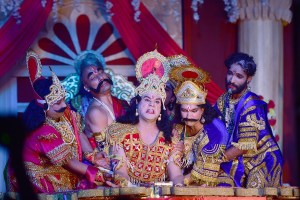
George Bernard Shaw once said: “Hinduism is so elastic and so subtle that the most profound Methodist, and crudest idolater, are equally at home with it.”
Hinduism is full of contradictions. A monotheist finds the apparent multiplicity of deities perplexing at first. But it also makes it the most tolerant religion in the world because it doesn’t focus exclusively on one god but rather embraces all potential deities.
The diversity in the selection of gods raises the fundamental question: What’s the core doctrine of the religion, and how does it still remain relevant in a world full of dominant monotheist religions like Christianity, Islam, and Judaism?
Hinduism’s great strength lies in the fact that it has proved to be the most adaptive religion. Hinduism is polytheistic. It has as many gods as you can imagine, more than 33 million, according to some sages.
This appears to be much more democratic because practically everyone has his 0r her own personal deity. Rather than worshipping somebody else’s god, it is far better to have your own private god; then there is no conflict. There is no objection. So there is freedom for everybody.
Long ago, a preacher known as Mahavira started a new religion, Jainism. Hinduism had no objection. Then the Buddha started Buddhism, and again Hinduism had no objection. Both were born Hindus, and both challenged the faith, yet they are respected by Hindus.
This is tolerance. It is your choice, you are free to choose your own path; you are even free to choose a religion that has no god, even a religion that has no soul. Charvakas were the perfect atheists.
Hinduism has historically been a religion of liberal thinkers. That’s why it has so many symbols and so many gods, because every intellectual expression or experience of the ultimate must be different from others. Nobody is superior, nobody is inferior, but nobody is equal either. People are simply unique, and incomparable. You are you, I am I.
Hinduism never believed in the superiority of thought but accepted differences as part of intellectual creativity. It has a liberal attitude of “Let’s agree to disagree” as opposed to “It’s my way or the highway.”
A country is a reflection of its society. Hinduism survived for thousands of years and became an integral part of India. Hindu values have been interwoven into the life pattern of India’s society. So despite attempts by Muslims and British kingdoms to force the country into one religion never ended successfully.
Hinduism behind India’s democratic success
Hinduism’s core liberal values of freedom of expression and tolerant attitude toward the beliefs of others beliefs also played a critical role in the success of Indian democracy for almost seven decades.
In a country with so much diversity that after every 200 kilometers the language and culture change, finding common ground is really hard. But Hinduism’s values of respecting and celebrating one’s diversity have played a pivotal role in shaping India’s democracy. And India is often viewed as a role model for other heterogeneous countries trying to transition toward democracy.
But today the liberal and democratic core value of Hinduism is facing a threat from its new version – Hindutva. Hindutva is a political doctrine, whereas Hinduism is a religious one. The idealogy was formed as a resistance force to unite the Hindus against invaders, particularly Muslims.
Hindutva’s aim is to form a nation of militant nationalists. It’s the monotheistic version of Hinduism. But Hindus’ core values are never monotheism. Hindus never believe in one god, one book or one religious leader.
Monotheisms have commandments, sacred books, and supreme leaders. Hinduism never has an agenda even to make a Hindu state. The idea of supremacy is considered naive in Hinduism.
So the rise of Hindutva will certainly upset the delicate equilibrium prevailing in a multicultural, multi-religious, and multilingual country like India.
Hinduism is the soul of India, and polytheism has been the core belief of the society for thousands of years. Any idea of making this country into a monotheism society will end drastically.
If the current model of Hindutva is not challenged by the people, then the growing restiveness within the country in terms of freedom of expression could cause major destabilization.
Pursuing Hindu unity through a monotheist approach may end up killing the very soul of India, the celebration of unity in diversity, the core message of Hinduism. How long can the body survive without the soul?

